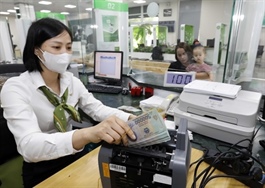Interest rate cutbacks designed to assist borrowers
Interest rate cutbacks designed to assist borrowers
Several Vietnamese banks implemented substantial interest rate reductions in 2023 to stimulate loan uptake across various sectors, despite challenges in meeting credit growth targets.

In the second half of November, MSB announced a significant interest rate cut, marking its fifth such reduction since the start of the year. This initiative, effective through late December 2023, is designed for individual clients seeking mortgage loans for home purchases, renovations, consumer goods, education abroad, and tuition payments.
Prior to this, SHB introduced a substantial interest rate cut of up to 2 per cent per annum, extending through the end of 2023. This reduction is targeted at existing clients, encompassing both individual and corporate borrowers, together with priority sectors such as agriculture, small- and medium-sized enterprises (SMEs), and green projects, among others.
Earlier this month, BIDV also implemented a reduction in interest rates for personal business and consumer loans. Specific rates have been adjusted to 5.4 per cent per annum for loans shorter than six months in environmentally sustainable sectors, and 6.4 per cent per annum for loans between 6 and 12 months.
A credit officer from a state-owned bank highlighted the difficulties in meeting targets, resulting in frequent staff resignations. “Businesses eligible for loans, especially at preferential rates, are scarce, while those willing to borrow often face reluctance in loan processing due to risk considerations.”
In a statement to the National Assembly on November 6, State Bank of Vietnam (SBV) Governor Nguyen Thi Hong attributed the year’s subdued credit growth to businesses experiencing a decline in orders. Households and entrepreneurs are still grappling with the aftermath of the pandemic.
“From the supply side, the SBV has been directing efforts to create better conditions for credit institutions in extending loans. It has taken multiple actions, including directing institutions to revise lending processes to reduce turnaround times and providing recommendations to various ministries and agencies to enhance credit access, especially for SMEs,” she said.
One of the key factors influencing the overall credit growth in the economy is the diminished credit uptake in the real estate sector.
As of September 30, the total loan portfolio of 28 banks marked a 9 per cent increase from the start of the year. Despite a consistent decrease in deposit interest rates, total customer deposits have shown an 11 per cent rise since the beginning of the year.
Dinh Quang Hinh, an analyst at VNDirect, predicts a further decline in lending rates towards the end of this year, owing to the rapid decrease in commercial banks’ cost of funds.
“The recent sharp decline in the funding costs for banks is likely to lead to a continued downward trend in loan interest rates in the coming months,” Hinh said.
Economic expert Dr. Le Xuan Nghia voiced scepticism about achieving the SBV’s target. “In the current economic context, it’s extremely challenging for the banking sector to reach the 14 per cent credit growth target. This would likely require a flurry of substantial loan approvals in the final days of 2023, which seems improbable,” he said.
BSC Securities, in its latest analysis report this month, referenced a pattern since 2016 where initial slow credit growth typically leads to a strong end-of-year rally.
“Despite a slow start, we expect the credit growth for 2023 to reach approximately 12 per cent, buoyed by a more optimistic economic outlook as the year ends,” BSC said.
The brokerage is optimistic about the overall credit growth, expecting it to improve to about 13-14 per cent.
“With continued relaxed monetary policies, increased public investment disbursement due to low capital costs, and manageable government debt repayment pressures, coupled with a slowly warming real estate market, we believe the credit growth will see an uptick,” BSC added.
Tran Thi Ha My, chief economist at Viet Dragon Securities, highlighted the government’s ambitious credit growth target for 2024 of 15 per cent, surpassing the 14-15 per cent goal set for 2023.
“Given the current pace of credit growth, which is aligning with only about a 10 per cent increase on-year, the 2024 outlook seems more optimistic. A reduction in interest rates creates a necessary condition, but a stronger recovery in business operations, investments, and consumption, particularly in housing loans, is crucial,” My said.


























